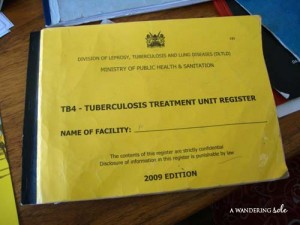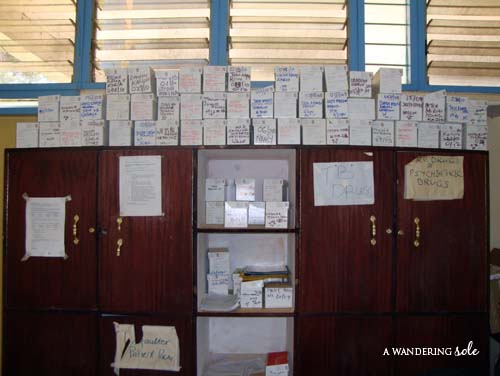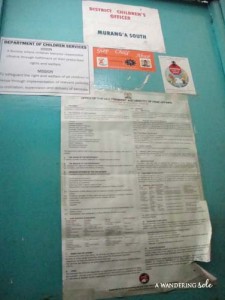Listen carefully, as this is one of my greatest pieces of travel advice: If you don’t have patience, don’t come to Kenya. Most of you who read this travel blog come from modern countries. You make an appointment if you want to go to the doctor or get your hair cut. If someone is more than 20 minutes late, they’re probably not going to show up. Our Western view places a high value on time, and the world just might collapse if we don’t stick to it.
In Kenya, time is viewed very differently. If a local tells you that they will arrive at noon, it could be 2pm or later. And there’s really no need for an apology. Sadly I have gotten used to Kenyan time. This morning I was 40 minutes late to meet up with James. Luckily for me he has no clock, so he may know I am late but he doesn’t know by how much :)
I believe the reasons for inefficiency in Kenya are as follows:
- Life is really damn hard. People are working in their shambas (fields), which are often not close to their home. They are collecting water from a neighbor’s well so they can drink, cook, and wash clothes. Activities that take us 10 minutes, take five times as long here.
- Virtually all Kenyans in rural areas rely on public transport. Have you seen these matatus? Although they do come fairly regularly, depending on the number of stops they make or the number of accidents on the road OR how many times you stop to pay off the police, can greatly affect the travel time. I’m made it from Nairobi to the village in as little as 1 hour 15 min. The next time, the very same trip took me 2 hours 10 min.
- People walk long distances. Just because there are matatus doesn’t mean people can afford to take them or that they stop that close to the village. I walk 15- 30 minutes depending on what matatu stage I go to, and then I wait for it to come.
- It’s a habit. If a friend in the village tells me they are going to meet me, I expect them to come late.
My experiences with Kenyan time

On April 28th, I ventured off to the Makuyu Clinic. My only encounter with this clinic in 2008 was taking sponsor children for HIV/AIDS testing. I thought of this trip as a learning experience as I actually hate the sight of blood and unsightly wounds. I was told that the clinic manager (who also does ‘counseling’) arrives at 9am. I showed up at 9:45am, and what did I do? I waited- he wasn’t there. Sometime after 10am he showed up, took me on a quick tour, and introduced me to the doctor. I sat in her ‘exam room’ (I have to use medical terminology loosely here) and observed. A baby yakked all over the floor, probably from having malaria. A man came in with a swollen eye after being beaten up. A little girl came in with a rash. Medicine really isn’t my cup of tea. Dr. Anne wanted me to learn how to take a person’s blood pressure. I felt so bad as this poor old man who had probably waited a long time to see the doctor, became my test patient. I took it once and pretended to have a clue what I was hearing. Then she made me take it again. After the second time when I could only figure out part of the blood pressure reading, I insisted I sit down. There were still at least 20 patients lined up outside, and it’s not like I was going to transform into a doctor anytime soon (or was I?). Dr. Anne took a break for tea around 11:30am. On Wednesdays there is the Tuberculosis clinic. TB patients come once a week to collect their drugs and weigh in to make sure they are gaining weight. When Dr. Anne showed me where they hold the TB clinic, there were already patients sitting outside. She said, “Did you see? There were only a few patients so we will make them wait until later.” That’s when the Western mindset kicks in, and I think, ‘Can’t they just make an appointment?’ But if they made an appointment, chances are they wouldn’t be on time. And then there’s the issue of not having a phone to be able to make the appointment.

We did come back a little later to start the TB clinic. At that point, I was assisting Dr. James. The patient would come in, and we would search for their box on the shelf containing their medicines. They have a patient number but of course the boxes are not arranged according to it. Sometimes it would take a little bit to find their box. Dr. James had to leave after seeing a few patients because a woman with asthma needed to be administered drugs in the labor ward. I was left along with the teacher from the orphanage to dispense drugs to patients. I guess I did transform into a doctor in a day. The manager also told me earlier in the day that the clinic currently doesn’t have a pharmacist, so if I wanted to measure and issue drugs from the pharmacy, I could. Hmm…
The next day, April 29th, was quite possibly one of my most frustrating moments of having to accept that time is NOT of the essence here in Kenya. I went on field work today, and instead of visiting sponsor children, we had to go to the town of Kenol to drop off our monthly report to the District Children’s Officer (DCO). This monthly report is one single sheet of paper. You write in how many kids there were at the orphanage last month, how many kids there are this month, and there is a small space for comments. We pay to take the matatu to Kenol, walk inside the district building and get in line in this tiny crammed back hallway. There is a bench full of people, and we have to stand. We wait. And we wait. The woman nexts to me stinks of B.O., and I desperately want fresh air. Forty-five minutes pass and finally the DCO door opens. One down, four more families to go. Even though you get the same answer pretty much every time, I can’t help but ask: “Erick, can’t we just mail the form in and be down with it?” His answer: “No.” “Okay well then, can’t they have a drop box here for these types of forms where we can just leave it.” Again, Erick tells me, “No. The Children’s Affairs Officer might want to ask us a question.”

Luckily, the next family only takes 20 minutes. Then, another couple go into his office, and a short time later the husband is being arrested for child neglect. An hour and 45 minutes later, the DCO opens his office door, greets us, and takes the paper. He doesn’t even invite us into his office after all of that waiting! He just says, “Is that all?” I feel like since we’ve waited so long, we should come up with something to talk about! As Erick and I are leaving the building, he says, “You know, we had to wait our turn. That’s how it is.” Umm, yes, I agree that’s how it is in Kenya, but back home, I would’ve slipped him the paper when he opened the door another time. Or better yet, I would have mailed it! Actually, that’s not true. I would have emailed it! We go to catch a matatu back to Pundamilia and I’ve never been so happy about Kenya’s inefficiency in all of my life. I had left my rain jacket on the matatu on the way to Kenol, and by some miracle, I was getting on the same one home. There was my rain jacket! Out of a million gabillion matatus in our area (half the cars on the road are these little minibuses), I snagged the same matatu 2 hours later. The waiting game is good for something!
I experienced almost something completely similar when I was working in clinics in South Africa. Patience is definitely a virtue when traveling through Africa!!!
.-= Andi´s last blog ..imgp2629 =-.